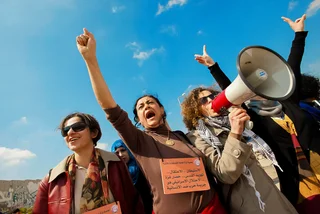As violence escalates between Israel and Hamas militants in Gaza, the ongoing humanitarian crisis has displaced over 1 million civilians and reignited debates around European immigration policy – including in Czechia.
Reluctance to accept Middle Eastern refugees?
Czechia has long maintained a cautious approach to accepting Middle Eastern refugees. While it instantaneously supported Ukrainian refugees following Russia's mass invasion in February 2022, Prague has not launched a visa or protection scheme for Palestinians, or Israelis, fleeing the current conflict.
However, with over 1 million people homeless in Gaza, pressure is mounting to assist civilians. Speaking in the Bez servítků interview series, Czech member of the European Parliament (MEP) Mikuláš Peksa warned Thursday that Czechia and the EU’s failure to help refugees could trigger a new migration crisis spilling into Europe. The MEP also accused Czech Defense Minister Jana Černochová of “lacking humanity and empathy.”
Striking a different note, Czech Interior Minister Vít Rakušan said the EU "needs stricter return policies for rejected asylum seekers." On Thursday, EU officials in Brussels called for "improved screening of migrants" and quicker expulsions of people who pose security risks, Reuters reports. EU Migration Commissioner Ylva Johansson stressed the need for a safer EU, emphasizing the swift return of people who pose security threats to their home countries and ensuring the safety of all citizens.
As of yet, neither the EU nor Czechia has launched a campaign to encourage Palestinians or Israelis to seek refuge in Europe.
Is more funding needed?
Prime Minister Petr Fiala said EU funds to Palestine must "undergo serious revision" despite the humanitarian emergency. While the EU recently announced it would triple aid to Gaza (reaching EUR 75 million; over CZK 1.8 billion), the Czech government has not committed to independent assistance after halting support to the Palestinian Authority six years ago.
On the other hand, when Minister of Foreign Affairs Jan Lipavský visited Israel less than two weeks ago, he promised that Czechia would fully support the country financially and by other means.
As the crisis fueling displacement shows no signs of abating, Czechia faces pressure to step up its response while balancing security, aid, and immigration policies. How the government tackles these challenges will have a sizable impact not only on the country itself, but also on the status of Middle Eastern refugees in Europe.












 Reading time: 2 minutes
Reading time: 2 minutes 




























